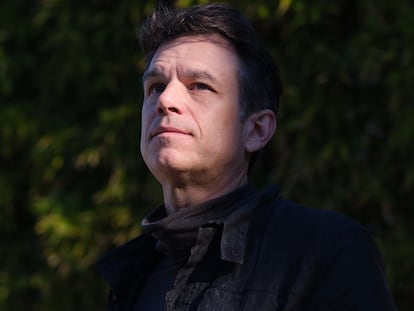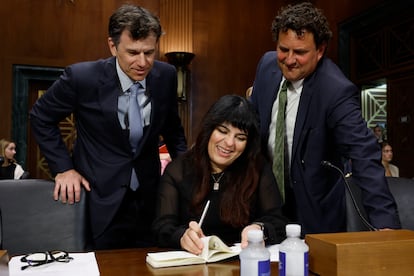The activist who’s taking on artificial intelligence in the courts: ‘This is the fight of our lives’
Matthew Butterick is leading a series of lawsuits against firms such as Microsoft, OpenAI and Meta. He is seeking to defend the copyrights of artists, writers and programmers

Matthew Butterick seems like a normal guy. He wears a baseball cap, clear-rimmed glasses and a colorful sports jacket. Behind him are two vintage keyboards and synthesizers — they add a bohemian touch to the basement of his Los Angeles home, which is also his office. “I have a collection of more than 20,” he notes, in a video call with EL PAÍS. Nothing in this scene suggests that Butterick is a lawyer… nor that someone so far removed from the classic suit-and-tie stereotype makes giants like Microsoft, OpenAI and Meta hold their breath.
The American has started a legal crusade against generative artificial intelligence (AI). In 2022, he filed the first lawsuit in the history of this field against Microsoft, one of the companies that develop these types of tools (GitHub Copilot). Today, he’s coordinating four class action lawsuits that bring together complaints filed by programmers, artists and writers. If successful, he could force the companies responsible for applications such as ChatGPT or Midjourney to compensate thousands of creators. They may even have to retire their algorithms and retrain them with databases that don’t infringe on intellectual property rights. “This is, for many of us, the fight of our lives,” he affirms. The first results of his efforts could arrive in a matter of months.
The New York Times took the same path as Butterick a few days ago, suing OpenAI and Microsoft for having used millions of articles from the newspaper (without consent) to train their algorithms. This the first media outlet to take this measure. “I can’t comment on the case because I haven’t read the lawsuit,” Butterick shrugs. “We were the first to sue Meta and OpenAI for training linguistic models with copyrighted material. We’re not surprised that others have subsequently done so. My partner Joe Saveri and I have always viewed our cases and other litigation as one part of an emerging global conversation about how generative AI will coexist with human creativity. This race has just begun,” he adds.
2023 was the year in which the world became aware of the potential of generative AI, which is capable of producing (apparently) original texts, images, or music. But the algorithms that make this possible are applied to gigantic databases made up of billions of documents, including texts, illustrations, or pieces of music. All of these works — without which automatic systems would be totally useless — have an author behind them, who not only isn’t compensated for AI’s use of their work, but who may become unemployed as generative AI tools become more sophisticated.
Butterick identified this danger in the summer of 2022, months before the emergence of ChatGPT. Born in Ann Arbor, Michigan, this 53-year-old American has made his living primarily as a typeface designer, programmer and writer. “Like many other creators and artists, it’s become clear to me that my work is doomed. It’s now part of the training data of many generative AI systems. The next step is to get rid of us,” he sighs.
The first product that put Butterick on alert was Microsoft’s GitHub Copilot, an AI-assisted software tool that trains with a host of open source software. He remembers how its launch sowed doubt among the programming community. The difference between Butterick and the rest of those affected is that he decided to take action on the matter. He dusted off the law degree that he obtained from the University of California, Los Angeles (UCLA) 15 years ago.
“After speaking with those affected, I concluded that this system is a violation of open source licenses and that it’s not a benign tool. It’s designed to replace open source programmers… I expressed this in my blog,” he points out. “Joseph Saveri — a lawyer I knew, who was a fan of my typography work — contacted me and said, ‘You know, the point you’re making about GitHub Copilot is pretty interesting.’ At the time, I wasn’t a practicing lawyer, so Joe and I embarked on an investigation and became convinced that there really was a case [to be made].”
In November 2022, Butterick and Saveri filed a lawsuit in the Northern District of California against Microsoft, owner of GitHub Copilot, alleging that the firm violates open license agreements. This was the first piece of litigation having to do with generative AI.

But programmers weren’t the only ones who saw their jobs in danger. After filing the lawsuit, a group of visual artists approached the lawyers. “They told us: ‘Wow, that sounds similar to the problem we have. Would you be interested in taking our case?’” This is how the legal process they opened in January 2023 against Stability AI, Midjourney and Deviant Art — the main generative AI tools applied to illustration — was conceived. This past November, they submitted amendments requested by the judge. The process continues, just like that of Copilot.
The third group that Butterick and Saveri represent are authors of books. In July, they filed two class-action lawsuits against OpenAI and Meta for including books written by plaintiffs — including Richard Kadri and Christopher Golden — in their training dataset.
A very real threat
Illustrator Karla Ortiz realized the tsunami that was about to hit her and her colleagues in the summer of 2022. This 38-year-old Puerto Rican artist has worked for most of the major Hollywood studios, including Marvel Studios, HBO and Universal Pictures, as well as video game production companies such as Blizzard and Ubisoft. Key characters from blockbusters such as Thor: Ragnarok, Doctor Strange and Jurassic World have been drawn up by her brushes. But not even someone of her status feels safe.
Ortiz began researching how generative AI tools are applied to illustration. She soon recognized the work of her colleagues in the drawings produced by the tools. “I was horrified to see that these platforms use your name, so that users can demand your style. [The AI] takes your work to generate images that look like yours,” she explains by video call from her San Francisco studio. “At that moment, I started to worry a lot. I’m a member of the board of directors of the Concept Art Association of America, which brings together artists who work for the film and video game industry. We decided to mobilize.”
Ortiz and two other colleagues became plaintiffs in the class-action lawsuit filed by Butterick and Saveri against Stability AI, Midjourney and DeviantArt. Her cause gained momentum when, this past July, she was called to testify before the U.S. Senate’s Subcommittee on Intellectual Property to talk about the legality and ethics of AI. “That would have been inconceivable a year earlier. Senators are taking seriously [the fact] that creators have their works taken away without their consent, without compensation and without credit,” Butterick notes. He accompanied his client to the Capitol.
“For illustrators, a traditionally important source of income is putting the ideas of producers and directors into images, to then show them to the studios. That activity has literally been erased by generative AI,” Ortiz says. “My job is at risk. It consists of showcasing ideas, and machines are now doing that really well. We artists cannot compete against those tools. I never worried about the future of my career until now.”
AI reaches the courts
The momentum generated by the class-action lawsuits filed by Butterick and his colleague has paved the way for more lawsuits. In 2023, Getty Images sued Stability AI for using images from its archive without permission. In September, two other groups of writers filed complaints against OpenAI. Bestsellers George R. R. Martin, John Grisham and Jonathan Franzen are among them. And, in October, several record labels — including the Universal Music Group — sued Anthropic, a company created by former OpenAI workers, for training its algorithms with copyrighted materials. Hollywood actors’ unions haven’t litigated yet, but they were on strike for months to improve their pay conditions and obtain guarantees that protect them against artificial intelligence.
Butterick and Saveri know that the fight is now or never. This wave of lawsuits basically says that generative AI is illegal. When this technology is fully established, it will be more difficult to go against the companies that develop it. But if the courts conclude that the training of algorithms is illegal, the blow to big tech could be massive. They would have to start over and redo their databases. It would also be disastrous for them to have to license these databases, negotiating payments in exchange for permissions from each source.
Is it too optimistic to think about such an outcome? “That’s happened before,” Butterick responds with a smile. “The FTC has investigated companies that used models based on private data and made them delete their databases and the algorithms and models built with them,” he explains. Cambridge Analytica — the consulting firm that used data from more than 80 million Facebook users to influence the 2016 presidential election — was the first company to suffer from the FTC’s new policy in 2019, dubbed “algorithmic destruction.”
In the EU, the pending regulatory framework on AI — whose final text is not yet public, although there has been wide consensus among member states — establishes the obligation for foundational models to comply with the bloc’s copyright regulations. We’ll have to wait for the fine print of the framework to see how it’s executed.
Butterick has put writing, design and programming on hold for almost a year to focus on his lawsuits. He believes this is the right thing to do. “I have the firm conviction that if I don’t stop my regular work and join these cases, I won’t have anything left. When we presented the first lawsuit — the one against Copilot — people looked at us as if we were crazy, or Luddites,” the American emphasizes. “Barely a year has passed and now, no one doubts the tremendous effect that generative AI has on creative professions. This has just begun. We have to establish safeguards so that this technology doesn’t put an end to everything.”
Sign up for our weekly newsletter to get more English-language news coverage from EL PAÍS USA Edition
Tu suscripción se está usando en otro dispositivo
¿Quieres añadir otro usuario a tu suscripción?
Si continúas leyendo en este dispositivo, no se podrá leer en el otro.
FlechaTu suscripción se está usando en otro dispositivo y solo puedes acceder a EL PAÍS desde un dispositivo a la vez.
Si quieres compartir tu cuenta, cambia tu suscripción a la modalidad Premium, así podrás añadir otro usuario. Cada uno accederá con su propia cuenta de email, lo que os permitirá personalizar vuestra experiencia en EL PAÍS.
¿Tienes una suscripción de empresa? Accede aquí para contratar más cuentas.
En el caso de no saber quién está usando tu cuenta, te recomendamos cambiar tu contraseña aquí.
Si decides continuar compartiendo tu cuenta, este mensaje se mostrará en tu dispositivo y en el de la otra persona que está usando tu cuenta de forma indefinida, afectando a tu experiencia de lectura. Puedes consultar aquí los términos y condiciones de la suscripción digital.









































